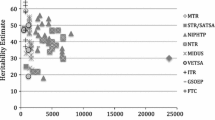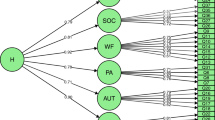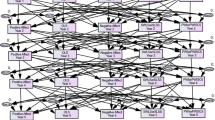Abstract
The relationship between the subjective well-being of parents and their own 12–16-year-old children was explored in a Spanish sample of N = 266 families. A positive relationship was expected due to both a shared environment and the possibility of the genetic transmission of subjective well-being ‘set-points’. A positive significant relationship was found for the summated scale of satisfaction domains forming the Personal Well-being Index, and for the specific domains of health and security for the future. However, no relationship was found for the other five domains that make up this Index or for satisfaction with life as a whole. We conclude while these results provide some evidence for the expected influence of a shared environment, they have failed to provide evidence for high heritability of set-points for subjective well-being.

Similar content being viewed by others
References
Astill, B. R., Feather, N. T., & Keeves, P. (2002). A multilevel analysis of the effects of parents, teachers and schools on student values. Social Psychology of Education, 5, 345–363.
Casas, F., Buxarrais, M. R., Figuer, C., González, M., Tey, A., Noguera, E., & Rodríguez, J. M. (2005). Values and their influence on the life satisfaction of adolescents aged 12 to 16: A study of some correlates. Psychology in Spain, 9(1), 21–33. Online journal. Available at http://www.psychologyinspain.com.
Casas, F., Figuer, C., González, M., & Coenders, G. (2004). Satisfaction with life domains and salient values for future: Data from children and their parents in five different countries. In W. Glatzer, S. von Below, & M. Stoffregen (Eds.), Challenges for quality of life in the contemporary world. Advances in quality-of-life studies, theory and research (pp. 233–247). Dordrecht: Kluwer.
Coenders, G., Casas, F., Figuer, C., & González, M. (2005). Relationships between parents’ and children’s salient values for future and childrens overall life satisfaction. A comparison across countries. Social Indicators Research, 73(2), 141–177.
Cummins, R. A. (1995). On the trail of the gold standard for life satisfaction. Social Indicators Research, 35, 179–200.
Cummins, R. A.. (1998). The second approximation to an international standard of life satisfaction. Social Indicators Research, 43, 307–334.
Cummins, R. A. (2003). Normative life satisfaction: Measurement issues and a homeostatic model. Social Indicators Research, 64, 225–256.
Cummins, R. A., Eckersley, R., van Pallant, J., Vugt, J., & Misajon, R. (2003). Developing a national index of subjective well-being: The Australian Unity Well-being Index. Social Indicators Research, 64, 159–190.
Cummins, R. A., Eckersley, R., Lo, S. K., Okerstrom, R., Hunter B., & Woerner J. (2004). Australian Unity Well-being Index: Report 12.0—The Well-being of Australians—Job Security (Australian Centre on Quality of Life, School of Psychology, Deakin University, Melbourne), http://acqol.deakin.edu.au/index_wellbeing/index.htm.
Cummins, R. A., Woerner, J., Tomyn, A., Gibson, A., & Knapp, T. (2005). The Wellbeing of Australians—Personal Relationships. Report 14, Part B, http://www.deakin.edu.au/research/acqol/index_wellbeing/Survey_14_Part_B.pdf.
González, M. (2006). A non-linear approach to psychological well-being in adolescence: Some contributions from the complexity paradigm. Girona: Documenta Universitaria.
González, M., Casas, F., & Coenders, G. (2007a). A complexity approach to psychological well-being in adolescence: Major strengths and methodological issues. Social Indicators Research, 80, 267–295.
González, M., Coenders, G., & Casas F. (2007b). Using non-linear models for a complexity approach to psychological well-being. Quality & Quantity. http://dx.doi.org/10.1007/s11135-006-9032-8.
Fay, R. E. (1985). A jackknifed chi-square test for complex samples. Journal of the American Statistical Association, 80, 148–157.
Jones, L. V., & Thurstone, L. L. (1955). The psychophysics of semantics: An experimental investigation. The Journal of Applied Psychology, 39(1), 31–36.
Lee, E. S., Forthofer, R. N., & Lorimor, R. J. (1989). Analyzing complex survey data. Newbury Park, CA: Sage.
Lykken, D., & Tellegen, A. (1996). Happiness is a stochastic phenomenon. Psychological Science, 7(3), 186–189.
Muthén, L. K., & Muthén, B. (2006). Mplus. Statistical analysis with latent variables. User’s guide. Los Angeles, CA: Muthén & Muthén.
Quenouille, M. H. (1956). Notes on bias in estimation. Biometrika, 43, 353–360.
Roysamb, E., Tambs, K., Reichborn-Kjennerud, T., Neale, M. C., & Harris, J. R. (2003). Happiness and health: Environmental and genetic contributions to the relationship between subjective well-being, perceived health, and somatic illness. Journal of Personality and Social Psychology, 85 (6), 1136–1146.
Sagiv, L., & Schwartz, S. H. (2000). Value priorities and subjective well-being: Direct relations and congruity effects. European Journal of Social Psychology, 30, 177–198.
Suldo, S. M., & Huebner, E. S. (2004). Life satisfaction, parenting, and adolescent behaviour. Social Indicators Research, 66, 165–195.
Thomson, R., & Holland, J. (2002). Young people, social change and the negotiation of moral authority. Children and Society, 16, 103–115.
Tukey, J (1958). Bias and confidence in not-quite large samples. Annals of Mathematical Statistics, 29, 614.
Author information
Authors and Affiliations
Corresponding author
Rights and permissions
About this article
Cite this article
Casas, F., Coenders, G., Cummins, R.A. et al. Does subjective well-being show a relationship between parents and their children?. J Happiness Stud 9, 197–205 (2008). https://doi.org/10.1007/s10902-007-9044-7
Received:
Accepted:
Published:
Issue Date:
DOI: https://doi.org/10.1007/s10902-007-9044-7




